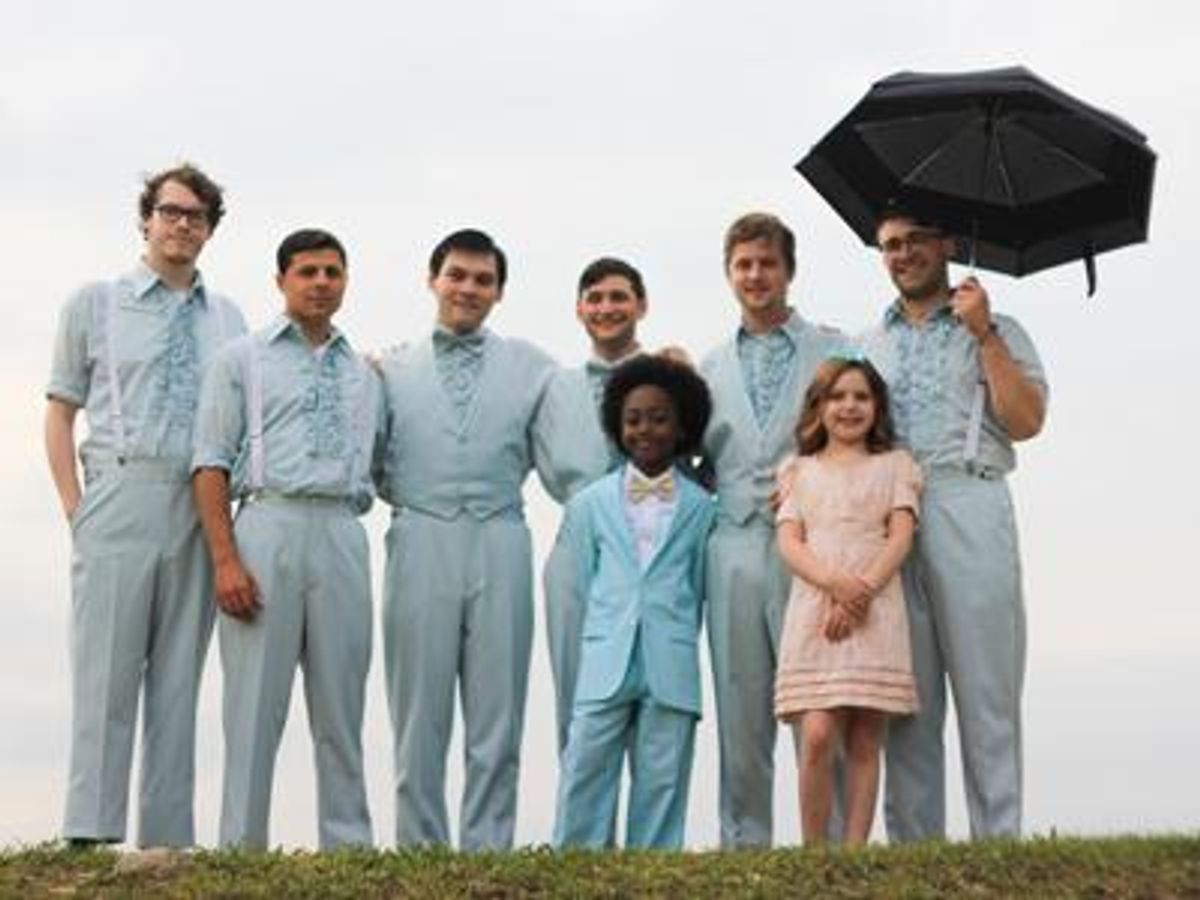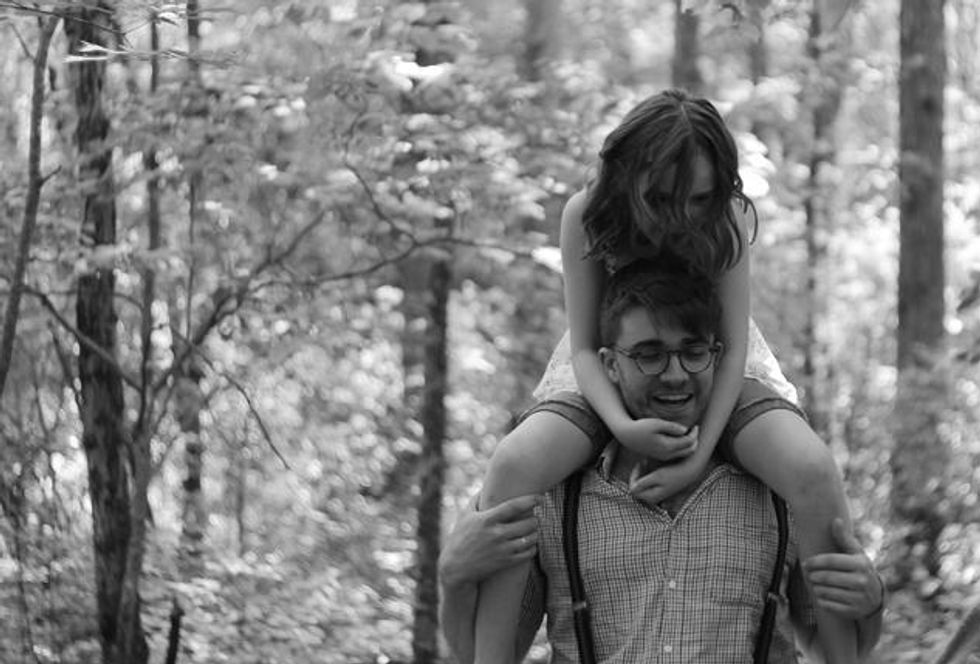So it's fitting that the six-piece, brass-fueled chamber-rock band from Brooklyn is debuting a powerful new music video and short film -- crowdfunded by more than 600 contributors to the the band's Kickstarter campaign -- on the national holiday meant to celebrate and remember the legacy of Dr. King. The music video is directed by Alex K. Colby.
The Advocate: What inspired you to record the song and have the video address topics that are so often considered controversial?
John-Michael Parker: We wrote this song, "Don't Ask Me Why," long before we had even the first idea of all that would come from it. The inspiration for the song was actually my time spent with New York City high school students through the Future Project, an education initiative I helped launch after college. Our big idea is that all young people need the opportunity to pursue their passions and explore their purpose so that they can put their dreams in action -- whatever they might be. So as I was really exploring this idea of dreaming and the typical notion folks have of either the pie-in-the-sky idealist dreamer, or the practical nose-to-the-grindstone doer, I thought I'd start writing a song with these two characters and let it play out through a story. And so "Don't Ask Me Why" came out, and it started to become an anthem among our friends and fans for dreaming, for taking bold risks and living a life that matters.
After playing the song a few times, we started to see just how powerfully folks connected with the emotions and the inspiration of the song, and so we started to think about a music video that could use the song to actually do something and make some change in the world. And that's when our best friend -- and director -- Alex Colby came up with the brilliant concept behind the video. The night he shared it with us, we immediately knew we had to make it a reality. At one level, we all connect with the story and these "controversial topics" differently, whether as a result of experiences with our own identities -- sexual, racial, and otherwise -- or the experiences of the people we love.
At a deeper level, however, we share the belief that all people deserve the opportunity to live happy, healthy, and self-expressed lives, that people should be able to love who they want to love, regardless of any label they or society place on that love, and that we don't yet live in such a world. So, as artists and changemakers, we considered the tools we had at our disposal -- namely, the ability to create an emotional experience that could inspire folks to think and maybe even act differently -- and so we set out to make a music video that would let people experience love and equality so that they might in turn spread that in the world.

As straight folks, why was it important for you to take a stand for LGBT equality?
In a world that is bigger and more beautiful and more unjust and more complex than we, as 20-somethings, can even begin to comprehend, there are certainly many systems and areas of inequality and oppression that ought to be addressed and changed. But, as I said above, LGBT inequality is one that, given our generation, the current political climate, and our own experiences, is right there in our faces every day. And regardless of our identity, we felt the desire to do something about.
Having said that, and to address the question itself, we actually don't all identify as straight. A few of us -- myself included -- have experienced the difficulty and anxiety created by a judgmental culture, specifically in high school, that creates a pressure for young people to identify with and accept, wholesale, all that comes along with labels as oversimplified and polarized as "straight" and "gay." And that sucked. And those of us who saw that from the other side knew it sucked too. And above all else, that we all acted in subtle and not-so-subtle ways to perpetuate that culture was really the most problematic. So when we saw the opportunity to tell a story that might help folks reconsider the assumptions and judgements they make about those identities, or, better yet, not pressure people to take on an insufficient label in the first place, we jumped at it.
Ultimately, the larger message in this video is infinitely more important than the roots of this project in the lives and personal stories of the band, the filmmakers, the actors, or the hundreds of people who came together to make it a reality. What's important is that we all believe in love and equality and the actions we can take to make those flourish in the world -- what that looks like to us today is by telling a story about interracial and same-sex couples ... who knows what that will look like for bands and filmmakers 50 years from now.
I know you're not a fan of binary terms like "gay" or "straight," but do you have an identity label that resonates with you, personally? I like to give folks the chance to self-identify rather than impose some larger societal expectation.
No, I don't. While I've never been clearer personally or more communicative about how I feel and what I believe and how I choose to practice my sexuality, I cannot claim any affirmative or declarative label; and, really, I think that's the whole point -- to open a more nuanced discussion and understanding of it all. So if I had to choose something to begin that discussion, I'd say "not straight" is an OK place to start, though I hardly think that serves as an empowering way to wrap up my being in two words -- or at least the part of my being that deals with something as special and vulnerable as the love and intimacy I choose to share with others.
For what it's worth, a few other folks very close to the project feel similarly regarding their identity, and so without speaking for anyone else, I think it would be honest and fair to say that others on our team have similar feelings and experiences and to emphasize that all of us agree with the underlying belief that folks should choose and describe their identity for themselves, on their own terms. As the lead singer and a main driver of this project, I have the privilege of being the one to share my personal story here -- nevertheless, I certainly don't want to take away the self-expression or solidarity of anyone else who was a part of this.
As white guys, did you have any trepidation around drawing parallels between the civil rights movement and the LGBT equality movement? That's a comparison that has been critiqued by some pundits, generally on the conservative ideology spectrum.
Absolutely! In the beginning, when Alex pitched his vision, we were all so grabbed by the moment when the narrative suddenly switched from one story of oppression, love, struggle, and equality to another, and even as people who think about and confront these issues regularly, the comparison was resonant and powerful. As we started to dig further into it, however, we began to have our reservations -- are these our stories to tell? Are we co-opting a struggle that we haven't experienced -- haven't fully suffered from or fully benefited from -- for our own personal, and ulterior, motives? Is this parallel one that would hurt or upset or dishonor the people who have been in these movements much longer than we possibly could have been? Worst of all, would this comparison actually feed into the broader system of inequality and oppression that we are trying to push back against?
These, of course, were the questions we confronted right away. And so we did our homework -- we read, we sought advice and guidance from academics and activists, we shared our idea with people who connect and identify with the themes in our video in ways that we don't, and we considered deeply our role as artists and changemakers and, most simply, as citizens.
And we realized that whatever we might say, someone would have something to say about it; we addressed our fears and concerns and did our very best to tell this story in a way that was nuanced and delicate and thoughtful and respectful, and we decided that however it turned out, as long as people were thinking about these issues through a new emotional lens, we'd done something powerful. Most importantly, upon sharing the concept countless times with countless people -- most often singing the song with an acoustic guitar while Alex described the the story, shot by shot, on top of the lyrics -- we found that people were left inspired and moved. And that's what we're going for. And that's what we hope this video will do.
We are so grateful to have the opportunity to fit into the tapestry of people and organizations across the world fighting for equality -- the scholars, the activists, the artists, the students, the politicians, the pundits, the lovers and families and individuals -- and we hope to share our voice with humility and gratitude.




















































































Viral post saying Republicans 'have two daddies now' has MAGA hot and bothered